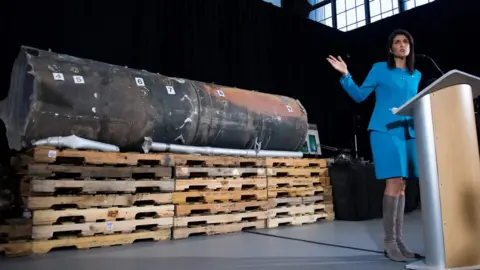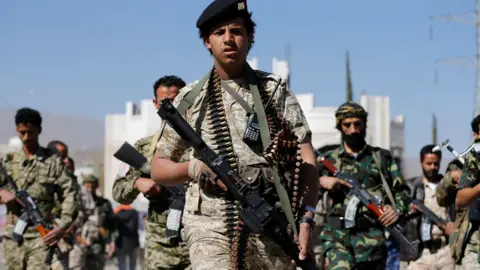Yemen rebel ballistic missile 'intercepted over Riyadh'
 Almasirah
AlmasirahThe Saudi-led coalition battling Yemen's Houthi rebels says it has intercepted a missile over Riyadh.
The Houthis' Al Masirah TV reported that a Burkan H2 ballistic missile had targeted a meeting at the al-Yamama Palace in the Saudi capital.
Witnesses said they heard an explosion and posted pictures online showing a cloud of smoke in the air. There were no reports of any damage or casualties.
The coalition accused Iran of supplying the Houthis with the missile.
Iran has denied arming the rebels, who have been fighting a war against Yemen's government and the Saudi-led coalition since March 2015.
What do the Houthis say?
A report on Al Masirah's website cited the Houthis' Missile Forces as announcing the launch of a Burkan H2 missile on Tuesday "in response to the heinous crimes committed by the US-Saudi aggression against the people of Yemen".
The missile had targeted a "meeting of the leadership of the Saudi regime in al-Yamama Palace in Riyadh", during which Crown Prince Mohammed bin Salman was expected to discuss the kingdom's annual budget, Al Masirah said.
The palace is the main headquarters of the king's office and the royal court.
Minutes later, Saudi state-run Al Ikhbariya TV reported that a missile had been intercepted south of the capital.
One video posted by a man who said he was in the Olaya district shows a white cloud above the city. The sound of an explosion can then be heard.
What do the Saudi authorities say?
Coalition spokesman Col Turki al-Maliki said the missile had been "indiscriminately launched towards Riyadh to target the civilian and populated areas", according to the official Saudi Press Agency.
It was intercepted by a Patriot missile south of the city, he added.

Col Maliki said the attack proved the "continued involvement of the Iranian regime in supporting the Houthi armed group with qualitative capabilities in clear and blatant defiance" of two UN Security Council resolutions with the aim of threatening regional and international security.
Firing missiles towards populated areas was against international law, he added.
What do we know about the Houthis' missiles?
Another Burkan H2 came close to hitting Riyadh's King Khalid International Airport on 4 November.
Saudi officials said US-supplied Patriot batteries had also intercepted the missile in flight. But analysts have since cast doubt on that assertion and said the missile's warhead landed close to the domestic terminal.
 AFP
AFPThe US, which backs the coalition's military campaign in Yemen, on Thursday presented what it said was "undeniable" evidence that Iran had made the missile.
Standing in front of the remnants of the projectile, permanent representative to the UN Nikki Haley said it bore a close resemblance to an Iranian-made Qiam ballistic missile.
Both lacked large stabiliser fins, included nine valves running along their lengths, and were stamped with the logo of an Iranian manufacturer, she added.
How has Iran responded to the accusations?
Saudi Arabia intervened in its neighbour's civil war partly to counter perceived Iranian influence on the Houthis, which champion the Zaidi Shia minority.
Iran has denied backing the rebels militarily and insisted that the missile launches are "independent actions" in response to Saudi-led coalition aggression.
 Reuters
ReutersA spokesman for Iran's mission to the UN, Alireza Miryousefi, rejected Ms Haley's allegations last week as "unfounded and, at the same time, irresponsible, provocative and destructive".
How might the Saudis respond to the attack?
The coalition tightened its blockade of Yemen in response to November's missile launch, saying it wanted to halt the smuggling of weapons. But the UN warned that the restrictions could trigger "the largest famine the world has seen for many decades".
Although the coalition later eased its restrictions, allowing humanitarian aid to be delivered to Houthi-controlled ports and airports, most commercial shipments are still blocked, causing severe shortages of food and fuel.
The Saudi-led coalition has also continued to conduct air strikes on rebel-held areas. Such raids have killed at least 136 civilians and non-combatants since 6 December, a UN human rights official said on Tuesday.
More than 8,670 people have been killed and 49,960 injured since the coalition intervened in Yemen's war, according to the UN.
The fighting and the coalition blockade have also left 20.7 million people in need of humanitarian aid, created the world's largest food security emergency, and led to a cholera outbreak that is thought to have killed 2,219 people since April.
